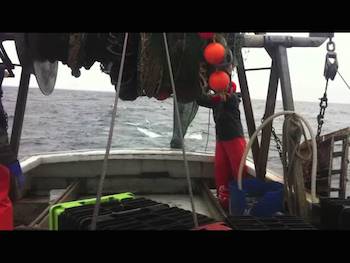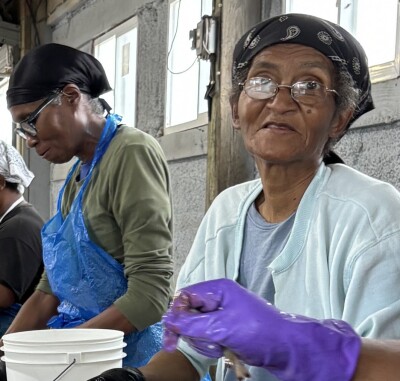“They Came to Fish” is the title of a well-known (for locals at least) history book about my hometown of Portsmouth, N.H. “They” were the European settlers who came in the 1600s to fish the rich waters of the Gulf of Maine. Most valuable was the plentiful cod, which were dried, salted and shipped back across the Atlantic.
The view off the back of the 44-foot Ellen Diane, which drags for groundfish out of Hampton, N.H.
Melissa Wood photoWhile those glory days are long past, cuts to cod quotas have left New Hampshire’s groundfish fishermen in dire circumstances. They lost 70 percent of their cod quota from 2014, which was already cut low. An allotment of 2,500 pounds per fisherman will likely mean a quick shutdown of the season that started May 1.
“You can catch (2,500 pounds) in a day,” Peter Kendall, manager of the Yankee Fishing Cooperative in Seabrook, told the Fosters Daily Democrat. “You can catch that in two hours if you’re looking for codfish.”
And to make matters worse, Gulf of Maine shrimp, a boom-and-bust winter fishery that often helps the fleet cobble together a fishing year, has been closed for two years.
The one piece of good news may also be the beginning of the end. Fishermen may be able to take part in a buyout of permits and boats, as part of the federal disaster relief granted to New England fishermen for the 2012-2013 season. Of the $33 million granted, New Hampshire fishermen received $2 million. As part of that, $200,000 will go toward forming a committee to examine the buyout option, according to John Bullard, NOAA’s Northeast administrator.
So what’s next? Will such a buyout lead to a 10-year shutdown while cod recovers? It may take longer. It looks like cod is finally returning to the coast of Newfoundland, where a collapse shut down codfishing for more than 20 years.
But the end of New Hampshire’s fleet has been predicted before. So far the fishery has remained active by having some keep their boats at the shore while leasing their quota. The members of the state’s only CSF, New Hampshire Community Seafood, are trying to establish a market for nontraditional species like hake, pollock and dogfish by educating the farmers market set about those species’ sustainable features.
Portsmouth is a fortunate little city, favored by a picturesque downtown and a restaurant scene that lures celebrity chefs from Boston. But a port without a working fleet just becomes a postcard — pretty but with no substance. The big question to me is will people care?







